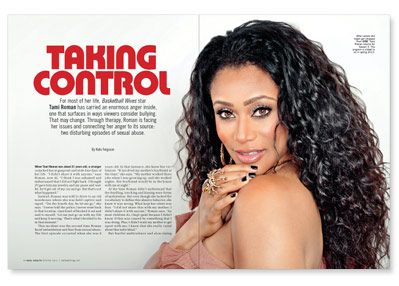
When Tami Roman was about 21 years old, a stranger carjacked her at gunpoint and stole four days of her life. “I didn’t share it with anyone,” says Roman, now 42. “I think I was ashamed and embarrassed that I did not fight back. I thought if I gave him my jewelry and my purse and wallet, he’d get out of my car and go. But that’s not what happened.”
Instead, Roman was told to drive to an old warehouse where she was held captive and raped. “On the fourth day, he let me go,” she says. “I never told the police; I never went back to that location. I just kind of blocked it out and said to myself, ”Let me just go on with my life and keep it moving.“ That’s what I decided to do in that moment.”
This incident was the second time Roman faced intimidation and fear from sexual abuse. The first episode occurred when she was 8 years old. In that instance, she knew her victimizer. “It involved my mother’s boyfriend at the time,” she says. “My mother worked three jobs when I was growing up, and she worked nights. Her boyfriend would be in the house with me at night.”
At the time Roman didn’t understand that the fondling, touching and kissing were forms of molestation. But even though she lacked the vocabulary to define this abusive behavior, she knew it was wrong. What kept her silent was fear. “I did not share this with my mother; I didn’t share it with anyone,” Roman says. “As most children do, I kept quiet because I didn’t know if this was caused by something that I was doing. Plus, I didn’t want my mother to get upset with me; I knew that she really cared about this individual.”
But fearful ambivalence and slow-rising anger about the incident found another outlet. “I became defiant and rude and acted out in school,” Roman says. “My mother knew there was something wrong, but I just explained things by telling her I didn’t like this man. I didn’t disclose why.”
Not speaking up is a big mistake, says clinical psychologist Mary Pipher, PhD, author of the book Reviving Ophelia: Saving the Selves of Adolescent Girls. “The sooner girls tell someone what happened and seek help, the better.” Finally, many years later, Roman did just that. On Season 4, Episode 9 of VH1’s hit reality show Basketball Wives, Roman disclosed the two incidences of abuse. “I talked to my mom about [the first incident] when I decided to bring the topic up on the show,” she says. “When I told her, we cried; she never knew. Of course, I never blamed my mother.”
Finally, many years later, Roman did just that. On Season 4, Episode 9 of VH1’s hit reality show Basketball Wives, Roman disclosed the two incidences of abuse. “I talked to my mom about [the first incident] when I decided to bring the topic up on the show,” she says. “When I told her, we cried; she never knew. Of course, I never blamed my mother.”
Roman’s revelation reflects the reality for many Americans. Statistics show that one in five girls—and one in 20 boys—are victims of sexual assault, according to “Child Maltreatment 2010,” a report from the U.S. Department of Health and Human Services’ Children’s Bureau. But the numbers are deceptive because child sexual abuse often goes unreported, so the incidence is probably far greater than what is reported to authorities.
Child sexual abuse takes a physical, psychological and emotional toll on children, but the damage often lasts well into their adulthood. For Roman, being molested as a child and raped as an adult helped fuel her warrior mentality. Today, she describes herself as a “fighter,” which can be a positive attribute. “But I have to say that I did not know that my deep-rooted anger or the way I deal with people stemmed from those things and the fact that I was holding them in for so many years,” she says. “That didn’t come out until I started going to therapy.”
On Basketball Wives, viewers pegged Roman as a bully with anger issues that needed to be addressed. When Roman talked with Real Health, viewers’ complaints about her behavior on the reality show had increased. But when asked if she felt her anger drove the drama on the show, Roman said no. “I think drama would exist [on the show] outside of me,” Roman says. “What people witness on the show are my reactions to certain situations I’m put in on the series. Sometimes, these circumstances are played out, and sometimes the audience doesn’t get the full picture because of the editing involved.”
In addition, Roman says, she views her behavior on the show as for entertainment purposes only. “When I’m with the girls and we’re taping, I consider that a job,” she says. “And when I’m away from them, I leave it there.”
Still, although the bullying and angry drama on the show are mostly scripted, the scenes contained enough truth in them for Roman to realize she wanted to address the issues in her real life. When asked on The Wendy Williams Show how her teenage daughters, Lyric and Jazz, felt about the way she acted on BBW, Roman admitted she felt bad because she’d embarrassed her girls.
So Roman decided she’d quit the fight club when BBW commenced its fifth season. “It’s ridiculous that I’m on TV and I have a huge platform,” Roman told Williams. “I should be responsible, I should be accountable, and I really haven’t been honoring that.”
On the popular series, Roman is one of several women who were previously married to or involved with professional basketball players. But like many of her costars, Roman has her own professional interests. Roman is an actress and was first runner-up in a Ms. Black California Pageant. Later, she was featured on the MTV reality series Real World: Los Angeles. In 1994, at age 24, Roman married NBA player Kenny Anderson and had their two girls.
“What I learned over time is that you can’t spend so much time in your life trying to please other people,” Roman says. “That’s why people see me say what’s on my mind. But people also have to learn that you can agree to disagree. Everything doesn’t have to be combative or argumentative.”
Roman was raised in a middle-class, single-parent household in White Plains, New York. When her mother met and married Roman’s future stepfather, Ali Akbar, Roman’s childhood changed dramatically. A practicing Muslim, Akbar gave Roman an appreciation for the value of higher education, a spiritual foundation and strong family values. But Roman also says that she rebelled against aspects of the Muslim culture that said women should be submissive to their husbands. “When I got older, I battled with that because I felt that wasn’t how I wanted to be treated in a relationship,” Roman says. “I like to be viewed as an equal party. I was defiant against the things I had been taught as a child. I saw my mother allowed my stepdad to have affairs while they were married until she couldn’t take it anymore and she decided to leave. Even as a child I felt that’s not the way it’s supposed to be, so, as an adult, I definitely wasn’t going to allow those things to happen to me.”
But Roman also believes that the four days she spent in captivity, not knowing whether she was going to live, made her hyper defensive. “I’m actually still in therapy,” Roman says, “because these things have been so deeply rooted, and there are things outside of these episodes of sexual abuse. Everything has to be dealt with one hurdle at a time.”
Roman agrees that for many black people, seeing a psychiatrist is like admitting you’re crazy. “That’s why I never really understood the value of being able to get some of those things off my chest by talking to someone who’s not biased,” Roman says. She then adds that therapists can help you think about the things you say, explore how your words and actions make you feel and ask why you react to things the way you do.
“I’d never really had that dialogue with anybody,” Roman reveals. Then she pauses a moment before continuing the thought. “For me, therapy has been a wonderful, eye-opening experience.”






1 Comment
1 Comment